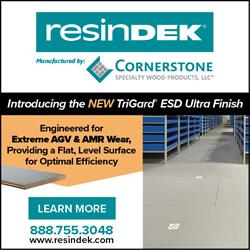ASTM International, Boeing, Others Developing Additive Manufacturing Standard for Plastics
The standard is a project of ASTM International’s Additive Manufacturing Center of Excellence, led by Wichita State University’s National Institute for Aviation Research (NIAR), launched last year to accelerate R&D, standardization, and innovation in additive manufacturing.
W. CONSHOHOCKEN, Pa., May 23, 2019 - ASTM International's committee on additive manufacturing technologies (F42) is developing a standard-guide for mechanical testing of additively manufactured plastics (WK66029). The guide aims to incorporate what has been learned about mechanical testing modification, interpreting results, and validating test methods with respect to additively manufactured polymer parts.
The standard is a project of ASTM International's Additive Manufacturing Center of Excellence, led by Wichita State University's National Institute for Aviation Research (NIAR), launched last year to accelerate R&D, standardization, and innovation in additive manufacturing.
Within WSU-NIAR, the National Center for Advanced Materials Performance (NCAMP) is developing material property data and statistical analysis reports for additively manufactured materials based on input from industry steering committees and government review boards.
Based on lessons learned through the first additive qualification program under the NCAMP process (ULTEM 9085), NIAR is conducting a round-robin study to better understand alternative methods and geometries that more appropriately characterize additively produced specimens. The study aims to drive consensus across multiple ASTM committees (F42 & D20) and offer universally-acceptable guidance for the AM industry.
"NIAR has the experience necessary to leverage material qualification efforts into applicable industry standards for adjacent material and technology systems, such as additive manufacturing," said John Tomblin, NIAR executive director. "The round-robin study is the next step in expanding on the work accomplished by the qualification program."
Partners like ASTM international member Chul Y. Park, an associate technical fellow at Boeing, notes that during Boeing's internal efforts to develop additive manufacturing technology, his team found that approaches that had worked well for traditional materials and subtractive manufacturing methods may not be optimal for additive.
"Boeing has a long history of working with industry stakeholders in multiple standards development organizations, as we believe in sharing common knowledge through industry standards," says Park. "As for the mechanical test methods for polymer-based AM, we coordinated with various standards development organization stakeholders, including ASTM International, to share the issues and Boeing's proposed solutions to those issues."
Boeing, as well as other industry partners, have been pivotal in driving these necessary changes in characterization of additive materials by sharing models and drawings of what are called "alternate tensile coupon designs" to be evaluated by the NIAR round-robin program.
Machine operators, printer manufacturers, material suppliers, testing laboratories, technology adopters, type-certification holders, and certificate regulators could all find the new guide useful.
ASTM welcomes participation in the development of its standards. Become a member at www.astm.org/JOIN. The next meeting of the committee on additive manufacturing technologies is September 16-20 in Senlis, France.
About ASTM International
Committed to serving global societal needs, ASTM International positively impacts public health and safety, consumer confidence, and overall quality of life. We integrate consensus standards - developed with our international membership of volunteer technical experts - and innovative services to improve lives… Helping our world work better.
Featured Product

